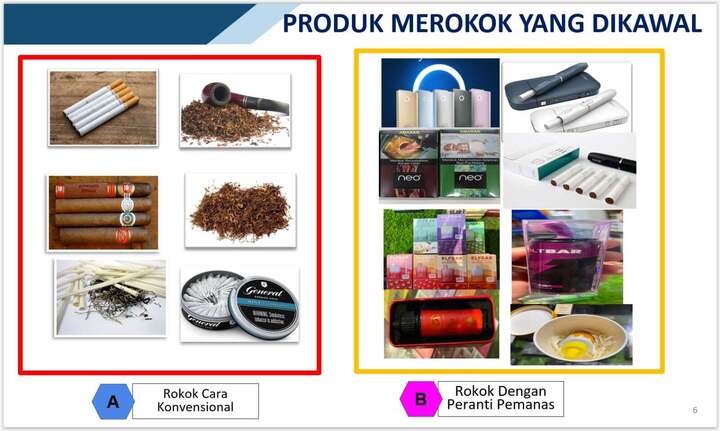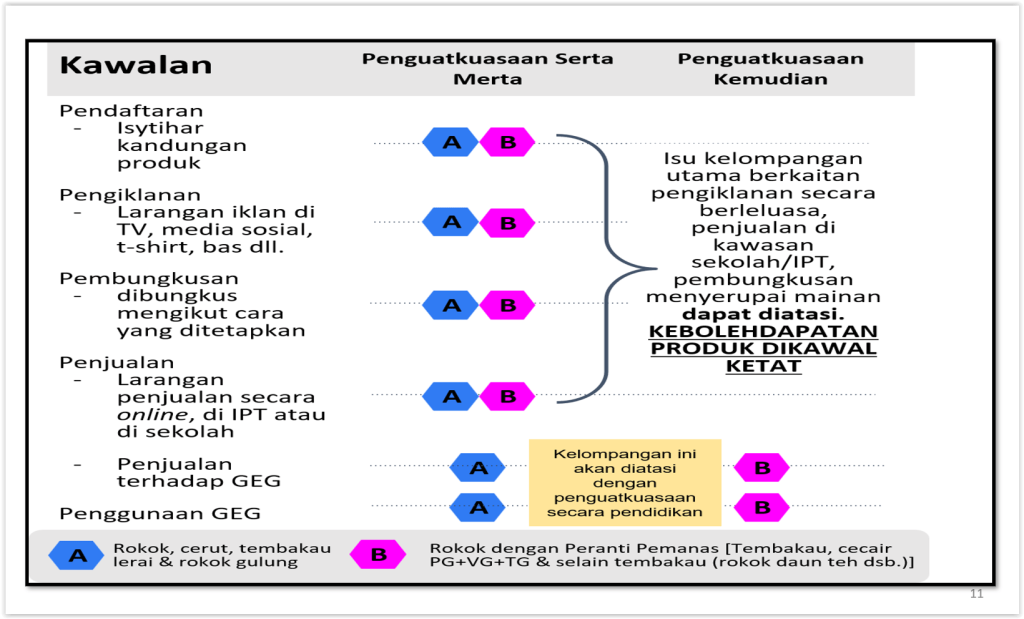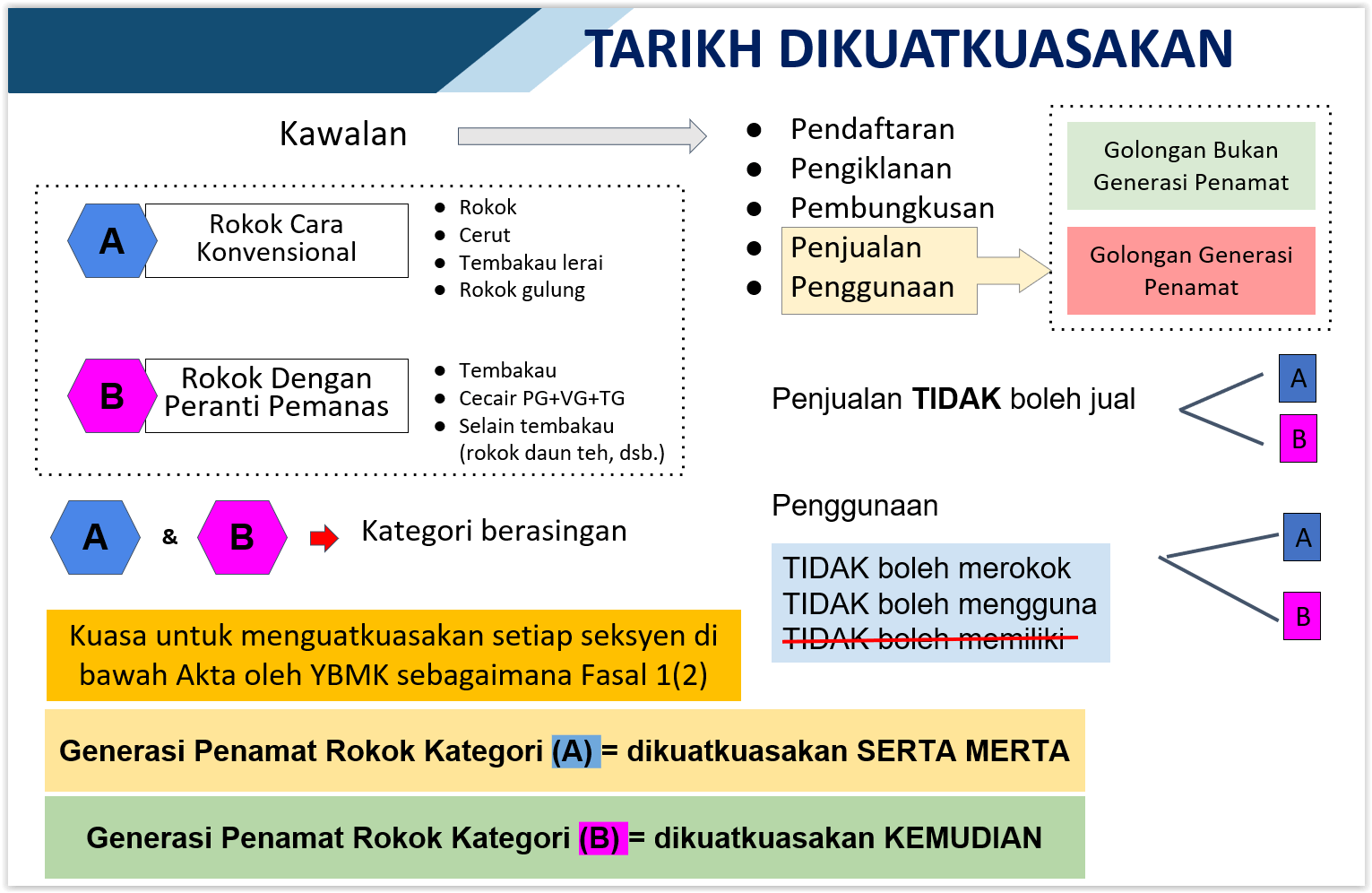KUALA LUMPUR, June 7 – The Control of Smoking Product for Public Health Bill 2023, an incredibly complex piece of legislation, proposes delayed prohibitions on vape and heated tobacco products for anyone born from 2007.
However, bans on conventional cigarettes will come into effect immediately for the cohort born on or after January 1, 2007, also known as the generational end game (GEG) group, should the bill be approved by Parliament.
According to a slide presentation by the Ministry of Health (MOH) on the tobacco bill that was given to the media yesterday, the Control of Smoking Product for Public Health Bill separates conventional cigarettes (cigarettes, cigars, tobacco leaves, rolled cigarettes, and smokeless tobacco) from cigarettes with heating devices (heat-not-burn cigarettes, e-cigarettes or vape, and non-tobacco products like tea leaf cigarettes).
Heat-not-burn or heated cigarettes are electronic devices that heat tobacco, instead of burning tobacco like conventional cigarettes. E-cigarettes or vape do not contain real tobacco, but contain flavoured liquid nicotine.
The tobacco bill proposes a ban on the sale and use of both categories of smoking products (conventional cigarettes and cigarettes with heating devices) only for the GEG group.
However, while prohibitions on the sale and use of conventional cigarettes for the GEG group will be enforced “immediately” after the bill comes into effect as an Act, the generational ban on e-cigarettes or vape and heat-not-burn tobacco products will only be enforced “later”.
MOH’s slides do not state when exactly the GEG ban on vape and heat-not-burn cigarettes would come into effect.
Crucially, MOH’s slides do not state a justification for the differentiated approach between conventional cigarettes and cigarettes with heating devices, with the proposed delay of GEG enforcement for the latter.
Throughout successive administrations, the MOH has never supported the harm reduction argument with e-cigarettes, vape, or heat-not-burn tobacco products touted by the industry. In fact, the MOH said as recently as last Monday that “any use of smoking products, including electronic cigarettes, is harmful to health”, in response to a nicotine poisoning case from vape involving a two-year-old girl.
MOH’s slides state that the Control of Smoking Product for Public Health Bill empowers the Health Minister to decide when to enforce each section under the Act, as per Article 1(2).
What this means is that while the tobacco bill proposes a generational ban on the sale and use of all tobacco and vape products for those born from 2007, enforcement of the GEG on vape and heat-not-burn cigarettes (among other types of cigarettes with heating devices) is unknown.
Even though the government verbally pledges “immediate” enforcement of the GEG ban on conventional cigarettes, the provision in the bill empowering the Health Minister to decide when to enforce different provisions means that the government is not legally tied to enforcing anything whatsoever in the bill immediately after the bill is gazetted as law.

Pending the actual enforcement of the GEG ban on cigarettes with heating devices, the government will engage in “educational enforcement”, according to MOH’s slides, such as warnings by MOH enforcers; targeted programmes in schools, tertiary educational institutions, and for youths; and continued advocacy.
This “educational enforcement” will continue until a date set by the Cabinet or until a mandatory review is tabled in Parliament on January 1, 2025.
The Control of Smoking Product for Public Health Bill includes a clause for mandatory reviews on the GEG bans (sale and use), as well as on the impact of the use of e-cigarettes, that are to be tabled before January 2025 (before the GEG cohort reaches the age of 18) and every five years in both Houses of Parliament.
The 2023 iteration of the tobacco bill, which is a completely new bill that must be tabled for first reading in Parliament, also contains several differences from the 2022 iteration of the bill that then-Health Minister Khairy Jamaluddin failed to push through the 14th Parliament.
These changes in the 2023 bill mitigate the punitive and authoritarian nature of the 2022 version: reduction in the fine for the GEG group from RM5,000 to RM500; introduction of community service while retaining the omission of custodial punishment for the GEG group; and removal of personal possession for the GEG group as an offence.
In the 2023 bill, prohibitions for the GEG group cover sale, purchase, and use, not personal possession of smoking products.
“This is to protect the end game generation and the following from potential abuse of power in the implementation of the bill, but at the same time, retains the current smoking offence,” states MOH slides.
Current tobacco regulations under the Food Act 1983 ban the ownership, use, and purchase of tobacco products by minors aged below 18, besides prohibiting the sale of such products to under-18s. However, the GEG ban in the tobacco bill is a prohibition on smoking for people born from a certain year (2007) through adulthood for the rest of their life.
The 2023 bill also drops body searches for the GEG group, since personal possession will not be an offence.
Unlike the 2022 bill with “wide enforcement powers”, the 2023 version limits enforcement powers to manufacturing, packaging, storage, delivery, distribution, and sale of tobacco products, according to MOH’s slides.
The Control of Smoking Product for Public Health Bill seeks to regulate registration (declaration of product contents); advertising (bans on ads on TV, social media, T-shirts, buses etc), packaging (packaged according to regulations); sale (bans on online sale and sales near schools or tertiary education institutions; ban for the GEG group); and use (ban for the GEG group) of tobacco products.

“This new bill still retains the smoking generational end game, but is based on the concept of ‘Win-Win Solution: Navigating Differences through Collaborative Compromise’,” states MOH’s slides.
“All of the issues debated during the tabling of the previous bill – including issues on judicial reviews, body searches, and wide enforcement powers – have been amended as per the recommendations of the parliamentary special select committee that reviewed the Control of Tobacco Product and Smoking Bill 2022.”
MOH’s slides also say that the gap (lacuna) in the law following the exemption of liquid nicotine from the Poisons Act 1952 can be addressed by restrictions on advertising, packaging, and sale in schools or tertiary educational institutions.
Pending passage of the tobacco bill, e-cigarettes and vape with nicotine are completely legal in Malaysia due to the delisting of liquid nicotine, without any restrictions whatsoever on sale to children and teenagers aged below 18, or any other regulations on nicotine content, flavours, advertising, or sale.
“The Smoking Generational End Game provision is bound to curb smoking, especially among youths, the productive group that is the main contributor to the country’s economy, besides saving 2.07 million lives,” states MOH’s slides.
“If the government does not implement this provision, the cost of treating complications from smoking conventional cigarettes will rise to RM8.77 billion, as well as to RM369 million for treating complications from using electronic cigarettes, by 2030.”
While smoking rates among secondary school students in Malaysia aged 13 to 17 fell over the past five years, the prevalence of current e-cigarette or vape use in this group of adolescents rose from 9.8 per cent in 2017 to 14.9 per cent in 2022, according to the National Health and Morbidity Survey: Adolescent Health Survey 2022.
The decline in Malaysia’s overall smoking prevalence among adults aged 15 and above has been slow over the past decade, dropping from 23.1 per cent in 2011, to 22.8 per cent in 2015, and to 21.3 per cent in 2019. Four in 10 adult men in Malaysia currently smoke.
While Malaysia is attempting to follow New Zealand’s move last December in banning tobacco products for the next generation, the crucial difference between both countries is that New Zealand’s smoking rate is only 8 per cent, among the world’s lowest prevalences, nearly three times lower than Malaysia.
Health Minister Dr Zaliha Mustafa said yesterday, after briefing MPs in Parliament, that the government will table the Control of Smoking Product for Public Health Bill for first reading in the Dewan Rakyat next Monday, just four days before the end of the current Dewan Rakyat meeting scheduled for June 15.
However, it appears that some MPs on both sides of the divide may still have objections towards the tobacco bill. Kinabatangan MP Bung Moktar Radin from Umno, who was pictured at the MPs’ briefing, reportedly still opposes the 2023 version of the bill.
In an Instagram Story yesterday, Khairy, who had first proposed the GEG last year, described Bung as an “enemy of public health” because the Sabah lawmaker was against the tobacco bill.
“Opposed it when I was Minister. Still opposes it. Probably thinks smoking doesn’t cause cancer,” Khairy said snarkily.
Unlike last year during Prime Minister Ismail Sabri Yaakob’s administration when the tobacco bill couldn’t reach a vote, this year – if the same thing happens next week due to bipartisan objection against the bill – it means that e-cigarettes and vape will remain completely unrestricted and legal for minors due to the deregulation of liquid nicotine.








